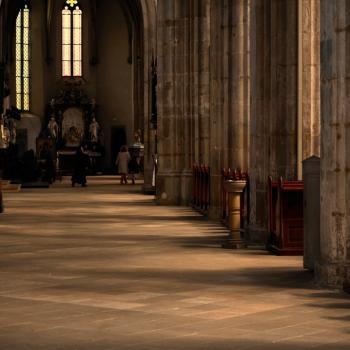Editors Note: This article is the second of a two part series. Read part one here.
Despite points of contention between Christians of different confessions, life in the Bible Belt offers glimpses of Christian unity in unexpected places. I was once approached in a parking lot by a woman who saw me limping and offered to pray healing for me on the spot. She and I had never met before, but praying aloud for a stranger was for her the hospitable thing to do.
That ethic of neighborliness perfumes southern air, which is why a man who brushed politely past my daughter into a restaurant turned out to be an instrument of grace. My family and I were waiting for tables, and the man entered the restaurant after we did. Whether it was the loveliness of my twelve-year-old, laughing with her brother, that slowed his steps I cannot say, but he noticed my daughter and said, "Excuse me, Little Bit," before making a beeline toward the hostess. It later occurred to me that the gallantry of that affectionate diminutive might be all the opening that the mother of Jesus needs to make inroads among people who think less of her than Catholics do.
My Baptist and Presbyterian friends admire Mary as the faithful mother minding baby Jesus in a manger, but pay scant attention to her after that. Their relative silence about all things Marian stands as a conscious counterweight to what they think is misplaced Catholic enthusiasm for Mary that in extreme form could partially obscure the saving work of her son. They have forgotten that love is not a zero-sum game for anyone who believes in a Triune God. We can adore Christ without forsaking his mother.
The ironic thing about efforts to marginalize Mary is that they often become backhanded compliments to how formidable she really is. As Robert Barron rather mischievously observed, "This young Israelite woman has beguiled the finest poets of the West, from Dante to T.S. Eliot." Top-drawer craftsmen from other guilds (think Schubert or Michelangelo) have also taken Mary to heart.
It was Mary who was greeted as "highly favored" by the Angel Gabriel, Mary who prophesied that "all generations shall call me blessed" because "He that is mighty has done great things for me," and Mary who launched her son's public career by alerting Him to a shortage of wine while they were guests at a wedding in Cana. Far from complicating devotion to Jesus, Mary's advice to the caterers there was "Do whatever He tells you." There is no ambiguity in that statement from the original steel magnolia.
My ethnic heritage folds seamlessly into thoughts like these. Willingness to ponder texts and play with metaphors comes naturally to those of us who have kissed the Blarney Stone. On the other side of the family tree, I do not have tribal confidence enough to drive a pickup with window tinting that evokes the image of Our Lady of Guadalupe on Juan Diego's poncho, even though I like some of the people who do.
By Southern Baptist standards, familiarity with Catholic piety, liturgy, history, and iconography makes me an odd duck, but not a hostile one. I may enjoy banana pudding as much as the next person, but I nevertheless, could easily be indicted for habitual failure to let my little light shine.
I too often try to dignify timidity by calling it diplomacy when conversations with esteemed non-Catholics veer into matters of faith. I have been known to forgo the Sign of the Cross in prayer with the same people. Not wishing to discomfit the peanut broker, the entrepreneur next door, or the woman who calls me for flyers advertising school events, I fret over whether it would be wrong to avoid a deacon with a heavy thumb while attending early Mass on Ash Wednesday. I've no cause to smirk at some Southern vanities while I'm preoccupied with questions about whether ashes on my forehead should be discreet because most of my friends are not similarly marked once a year.
A few of my co-religionists have suggested that embracing the full gamut of Catholic thought and tradition in a Protestant environment risks abandoning the Pauline precedent of being "all things to all men for the sake of Christ."
I understand that anxiety, but also know that reticence packaged as charity can sometimes be a lesser thing. One does not meet people where they are by jettisoning a vision of where they could be. Saint Paul continued his tent-making while striving to be all things to all men for the sake of the gospel; he did not take up archery or origami.




